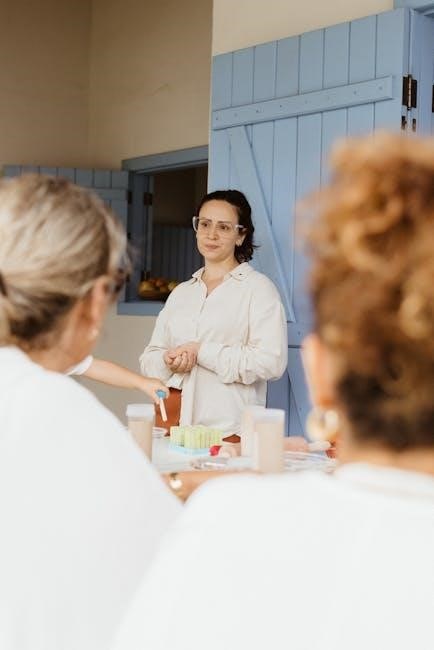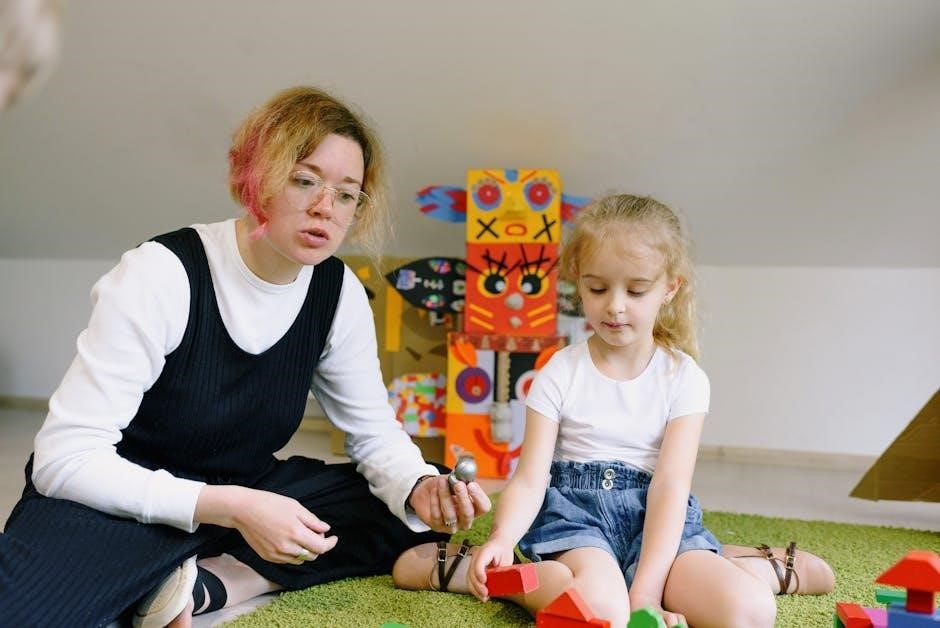Social skills are essential for effective communication and building relationships. They include verbal and non-verbal interactions, crucial for academic and personal success. Free PDF resources are available to help develop these skills.
1.1 Definition and Importance of Social Skills
Social skills refer to the abilities necessary for effective communication and interaction with others. They include understanding social cues, initiating conversations, and resolving conflicts. Developing these skills is crucial for forming meaningful relationships, achieving academic success, and navigating everyday challenges. Without strong social skills, individuals may struggle with peer interactions and emotional well-being. Fortunately, resources like free PDF worksheets and guides are available to help individuals improve these essential life skills, making social interactions more confident and meaningful.
1.2 Why Social Skills Matter in Everyday Life
Social skills are vital for navigating daily interactions, building relationships, and achieving personal and professional success. They help individuals communicate effectively, understand others’ perspectives, and manage conflicts. Strong social skills foster empathy, collaboration, and mutual respect, which are essential in both academic and workplace environments. Without these skills, individuals may face challenges in forming friendships, resolving disagreements, and thriving in social settings. Developing social skills early on can significantly enhance mental well-being and open doors to lifelong opportunities for growth and connection.

Key Components of Social Skills
Social skills form the foundation of effective communication and interaction. They include verbal communication, nonverbal cues, active listening, and empathy, enabling individuals to navigate social interactions smoothly and build meaningful relationships.
2.1 Verbal Communication Skills
Verbal communication skills are fundamental to expressing thoughts and ideas clearly. They involve using appropriate language, tone, and pace to convey messages effectively. Free PDF resources offer exercises to improve articulation, reduce filler words, and enhance conversational flow. Practicing these skills helps build confidence and ensures messages are understood accurately. Worksheets and activities in PDF formats provide structured guidance for mastering verbal communication, making social interactions more meaningful and impactful.
2.2 Nonverbal Communication and Body Language
Nonverbal cues like facial expressions, eye contact, and posture significantly impact interactions. Body language conveys emotions and intentions, often more powerfully than words. Free PDF guides provide exercises to recognize and practice positive nonverbal signals, fostering empathy and understanding. Activities include interpreting gestures and mirroring techniques to build rapport. Mastering these skills enhances personal and professional relationships, ensuring messages are conveyed accurately and effectively. Worksheets and downloadable resources help individuals improve their nonverbal communication, leading to more harmonious social interactions.
2.3 Active Listening and Empathy
Active listening involves fully engaging with others, understanding their emotions, and showing empathy. It builds trust and strengthens relationships. Free PDF guides offer exercises to improve these skills, such as reflection activities and group discussions. Empathy allows us to connect deeply, while active listening ensures clear communication. Practicing mindfulness during interactions enhances these abilities, fostering a supportive environment. Worksheets and downloadable resources provide practical strategies to develop these essential social skills, helping individuals navigate conversations with compassion and understanding.

Benefits of Developing Social Skills
Developing social skills enhances relationships, boosts confidence, and improves mental well-being. Free PDF resources provide practical tools to strengthen communication, empathy, and conflict resolution abilities effectively.
3;1 Improved Relationships and Friendships
Developing strong social skills fosters meaningful relationships and lasting friendships. Effective communication, empathy, and understanding others’ perspectives create a foundation for trust and mutual respect. By learning how to navigate social interactions with confidence, individuals can build connections that enrich their personal and professional lives. Free PDF resources offer exercises and guides to enhance these abilities, helping individuals of all ages form stronger, more supportive relationships.
3.2 Enhanced Academic and Professional Success
Social skills significantly impact academic and professional success. Effective communication, teamwork, and problem-solving abilities enhance performance in educational settings and the workplace. Strong interpersonal skills foster positive interactions with peers and colleagues, leading to better collaboration and shared goals. In professional environments, social competence is crucial for leadership, networking, and career advancement. Free PDF resources provide practical exercises to refine these skills, ensuring individuals can navigate academic challenges and thrive in their professional lives with confidence and adaptability.
3.3 Better Mental Health and Well-being
Developing strong social skills fosters better mental health and well-being by reducing anxiety, stress, and feelings of isolation. Effective communication and empathy help build supportive relationships, which are vital for emotional resilience. Free PDF resources and guides emphasize the importance of social interactions in maintaining mental health. By improving self-esteem and confidence, individuals can better navigate life’s challenges, leading to a more balanced and fulfilling life. These skills also enhance emotional intelligence, enabling individuals to manage emotions and respond to situations constructively.

Learning and Teaching Social Skills
Social skills are learned through practice, guidance, and real-life interactions. Free PDF resources offer structured activities and exercises to help individuals improve communication, empathy, and confidence effectively.
4.1 How Social Skills Are Learned
Social skills are primarily learned through observation, imitation, and practice. Children and adults alike absorb these skills by interacting with others and receiving feedback. Free PDF resources provide structured exercises and activities to enhance learning. These materials often include worksheets, role-playing scenarios, and step-by-step guides. They cater to various learning styles, ensuring that individuals can develop communication, empathy, and confidence effectively. Consistent practice and real-life application are key to mastering these skills, making PDF guides a valuable tool for educators and individuals alike.
4.2 Effective Strategies for Teaching Social Skills
Effective strategies for teaching social skills include role-playing, real-life scenarios, and positive reinforcement. Teachers use resources like the Social Skills Checklist and books such as The Bully Free Classroom to guide instruction. PDF worksheets and activities provide structured exercises for practicing communication and empathy. Role-playing helps learners apply skills in realistic settings, while feedback and encouragement reinforce positive behaviors. These methods create a supportive environment for individuals to grow confidently in their social interactions and emotional intelligence.
4.3 Role of Teachers and Parents in Social Skill Development
Teachers and parents play pivotal roles in fostering social skill development. They collaborate to create supportive environments, using resources like the Social Skills Checklist and books such as The Bully Free Classroom. Parents model behaviors at home, while teachers incorporate structured activities in the classroom. Both provide feedback and encouragement, reinforcing positive interactions. Their combined efforts help individuals develop empathy, communication, and conflict resolution skills, essential for lifelong relationships and personal growth.
Free Resources for Social Skills Development
Free PDF worksheets, books, and online tools are widely available, offering practical activities for improving communication, emotional intelligence, and social interactions in various settings.
5.1 Free PDF Worksheets and Activities
Free PDF worksheets and activities are excellent tools for developing social skills. They often include exercises on communication, emotional intelligence, and conflict resolution. Many resources are designed for specific needs, such as autism or anxiety, and are available for download. These worksheets can be used by teachers, parents, or individuals to practice skills like active listening, empathy, and appropriate interactions. Activities are engaging and tailored to different age groups, making them versatile for various learning environments. They provide structured exercises to help build confidence and improve social interactions effectively.
5.2 Recommended Books and Guides

Several books and guides are available to help improve social skills, many accessible as free PDF downloads. Titles like The Bully Free Classroom by Allen Beane offer practical strategies for educators. Jill Kuzma’s resources provide lessons on emotional intelligence and social interactions. These guides are designed for teachers, parents, and individuals, covering topics like communication, empathy, and conflict resolution. They serve as valuable tools for fostering social development and can be easily downloaded to support learning in various settings.
5.3 Online Tools and Downloads
Various online tools and downloads are available to enhance social skills development. Websites like jillkuzma.wordpress.com offer free PDF resources, including worksheets and activities. Indiana University’s resources provide step-by-step guides for teachers. These tools cover topics such as communication, empathy, and conflict resolution. Many are available in downloadable formats, making it easy to access and use them in educational or personal settings. They cater to diverse needs, ensuring comprehensive support for social skills growth.

Overcoming Challenges in Social Interactions
Social challenges like shyness, anxiety, and peer conflict can hinder interactions. Strategies to manage these include building confidence, practicing empathy, and fostering cooperation to improve social harmony.
6.1 Managing Shyness and Anxiety
Shyness and anxiety can significantly hinder social interactions. Strategies to manage these include gradual exposure to social situations, mindfulness practices, and positive self-talk. Empathy and active listening can also help build connections; Overcoming these challenges requires patience and consistent practice. Free PDF resources, such as worksheets and guides, offer practical exercises to address shyness and anxiety. These tools provide structured approaches to improve confidence and reduce discomfort in social settings, fostering healthier interactions and personal growth.
6.2 Dealing with Peer Conflict and Bullying
Peer conflict and bullying can have lasting effects on individuals, making social interactions challenging. Addressing these issues requires empathy, clear communication, and problem-solving skills. Strategies include staying calm, using “I” statements, and seeking support from trusted individuals. Free PDF resources offer practical exercises to navigate such situations, fostering resilience and emotional well-being. These tools emphasize the importance of understanding others’ perspectives and developing assertiveness to resolve conflicts constructively.
6.3 Building Confidence in Social Settings
Building confidence in social settings is crucial for fostering meaningful connections. It involves practicing mindfulness, positive self-talk, and gradual exposure to challenging situations. Free PDF guides and worksheets provide structured activities to help individuals identify and overcome self-doubt. Strategies like setting small, achievable goals and reflecting on successes can enhance self-esteem. These resources emphasize the importance of embracing a growth mindset, believing in one’s ability to improve. By consistently practicing these techniques, individuals can navigate social interactions with greater ease and confidence, leading to more fulfilling relationships and experiences.
Practical Tips for Improving Social Skills
Practical tips for improving social skills include using free PDF worksheets, setting achievable goals, and practicing mindfulness in interactions. These tools help build confidence and foster positive relationships.
7.1 Setting Goals for Social Improvement
Setting clear, achievable goals is key to improving social skills. Start with small, specific objectives, like initiating conversations or active listening; Break larger goals into manageable steps. Use free PDF guides to track progress and stay motivated. Celebrate successes, no matter how small, to build confidence. Regularly review and adjust goals to ensure they align with your growth. Persistence and self-encouragement are vital for steady improvement in social interactions and relationships.
7.2 Practicing Mindfulness in Social Interactions
Practicing mindfulness in social interactions involves being fully present and aware of your thoughts and emotions. This helps reduce anxiety and improves focus during conversations. Start by taking deep breaths before engaging, and listen actively without planning your response. Mindfulness fosters empathy and understanding, allowing for more genuine connections. Use free PDF guides to explore exercises that enhance self-awareness and emotional regulation. Regular mindfulness practice can lead to calmer, more meaningful social interactions and stronger relationships.
7.3 Learning from Social Interactions
Learning from social interactions involves reflecting on experiences to identify what works well and what doesn’t. Pay attention to others’ responses and adjust your behavior accordingly. Free PDF guides offer exercises to improve self-awareness and communication. Practicing mindfulness during interactions helps you stay focused and adapt naturally. Over time, this reflective approach fosters personal growth and builds confidence in navigating diverse social situations. Use these insights to refine your skills and enhance your ability to connect meaningfully with others.
Social skills are vital for personal and professional growth. They enhance relationships, communication, and mental well-being. Utilize free PDF resources to continue improving and thriving socially.
8.1 Summary of Key Points
Social skills are essential for effective communication, relationships, and personal growth. They encompass verbal and non-verbal interactions, empathy, and active listening. Developing these skills enhances academic and professional success, mental well-being, and overall life quality. Learning social skills is a lifelong process, shaped by experiences, teaching, and practice. Utilizing free PDF resources, such as worksheets and guides, can provide structured support for improvement. By fostering these abilities, individuals can navigate social interactions with confidence and build stronger connections in all areas of life.
8.2 Encouragement to Keep Practicing Social Skills
Consistently practicing social skills is key to personal growth and stronger relationships. Embrace challenges as opportunities to learn and improve. Utilize free PDF resources, like worksheets and guides, to enhance your journey. Celebrate small victories and stay motivated by setting realistic goals. Remember, social skills are lifelong tools that open doors to new experiences and connections. Keep striving for progress, and watch your confidence and interactions flourish over time.